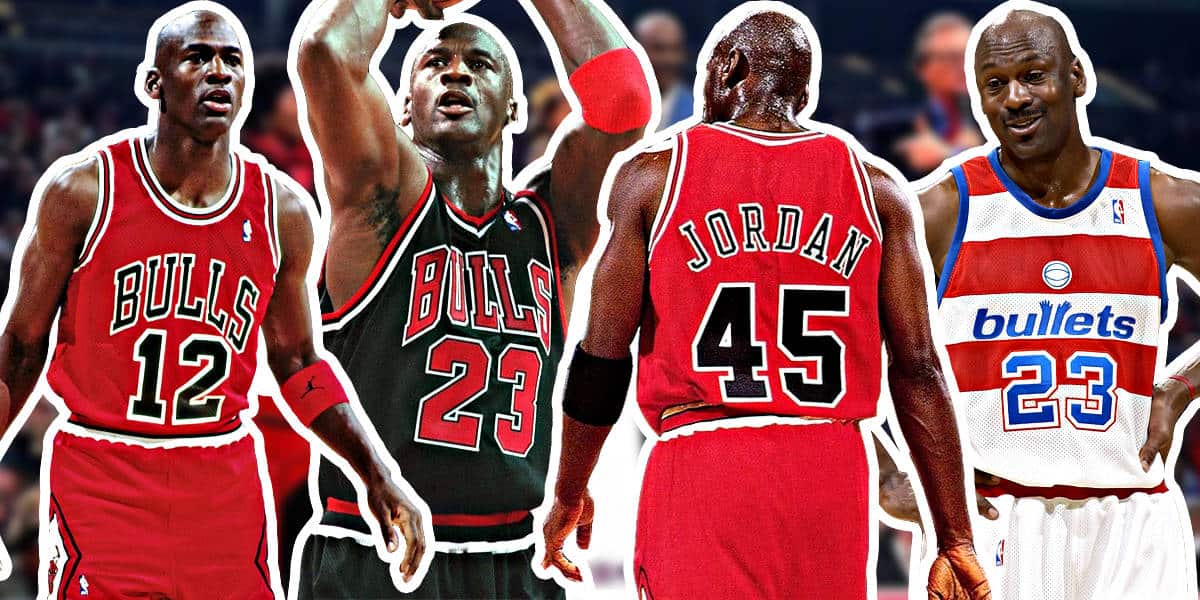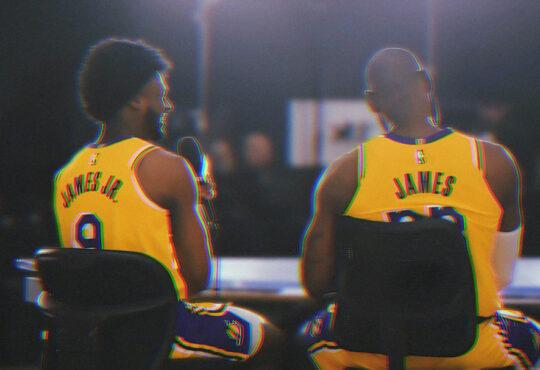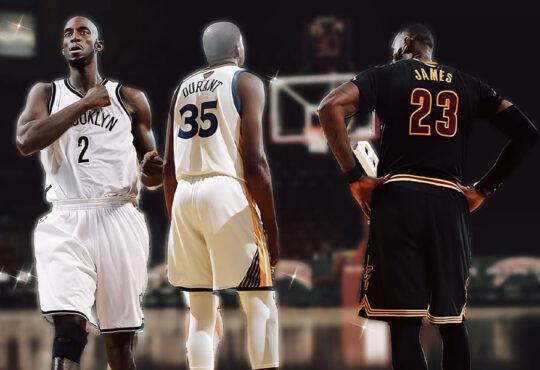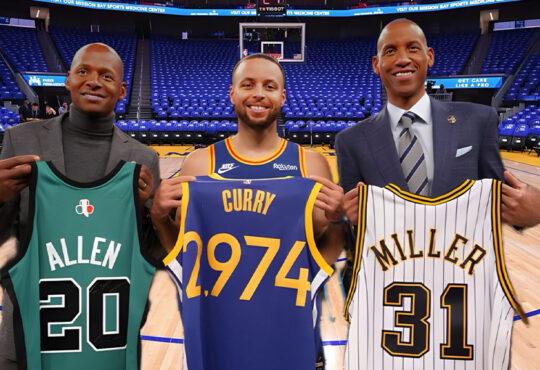
What Jersey numbers did Michael Jordan wear?
What Jersey numbers did Michael Jordan wear? The debate of who is the NBA’s greatest player of all time is never-ending. Most NBA fans, especially those who witnessed Michael Jordan play, consider MJ as being the GOAT while many younger fans think that LeBron James has surpassed Michael Jordan and has become the greatest ever.
Michael Jordan played 15 seasons in the NBA, 13 with the Chicago Bulls, and two with the Washington Wizards.
He is widely considered not just the best basketball player but one of the greatest athletes ever mainly because of the global impact he had during his playing days.
The NBA as an organization and as a culture was not the same when MJ got to the league and when he left for good. In the mid-’80s when MJ was drafted by the Bulls, NBA was still just an American league and the NBA arenas were not packed as they are today. As MJ grew as a player he became the face of the league that in the next decade became the most popular sports league in the world and MJ became the most famous athlete.
So what is the first thing that comes to your mind when someone mentions Michael Jordan and that is not the Chicago Bulls?
Of course, it is the number 23, he wore for most of his career. There are many players who have chosen to wear number 23 just because of Mike and one of them certainly is LeBron James.
Jordan’s 23 was and still is so huge that people all around the world still connect that number with his name. Wherever you see 23, Michael Jordan comes to your mind.
But not every NBA fan from the younger generation knows that 23 is not the only number Michael Jordan ever wore.
When MJ returned to the game of basketball after his short sting in baseball, he actually wore number 45 in the 1994-95 season with the Bulls.
Jordan talked about why he wore No. 45 when he returned in the spring of 1995 in Episode 8 of “The Last Dance.”
“I didn’t want to wear 23 because I knew my father wasn’t there to watch me, and I felt it was a new beginning and 45 was my first number when I was playing in high school,” Jordan said.
Things changed when the Bulls faced the Orlando Magic in the 1995 playoffs. The Bulls lost Game 1 in Orlando in the Eastern Conference semifinals with Jordan committing two turnovers in the final minute of a close game.
“After the game, Nick Anderson said ‘45 isn’t 23,’” Horace Grant said in the documentary. “Oh, man (while rolling his eyes).”
Jordan came out with No. 23 on for Game 2, and the Bulls won in Orlando.
“I just felt like 45 wasn’t natural,” Jordan said. “I wanted to go back with the feeling I had with 23.”
Jordan wore No. 23 for the rest of the series and the rest of his career, but that series sparked the 72-win 1995-96 Bulls which went on to win the NBA title.
“That was one of Michael’s lowest points when he came back and they didn’t win,” Ahmad Rashad said. “He hated the fact that Horace was on the other team when they beat him and just to watch all the celebrating that they were doing. I think that’s what he took to heart. He used that for that next year.”
But if you think that these two numbers are the only ones Jordan ever wore in the NBA, you are wrong again.
On Valentine’s Day, 1990, Michael Jordan attempted the second-most field goal attempts in a regular-season game in his career (43), scoring 49 points in 47 minutes in Orlando against the Magic.
And he did it not in his famed No. 23 jersey but wearing the No. 12.
Why? This is a story that has long been shrouded in mystery. An investigation by Chris Johnson of Sports Illustrated on the game’s 25-year anniversary found the most plausible outcome to be that the jersey was snatched from the visitor’s locker room at Amway Arena sometime between morning shoot-around and when the Bulls arrived pre-game. There was an area-wide search for the jersey before tip — including an announcement from the PA system — and the soliciting of fans for a red Jordan Bulls jersey that might fit him, according to Johnson. Nothing was found, and Jordan eventually had to play the game in a nameless, No. 12 thread.
So whatever number Michael Jordan wore, he made it one to remember simply because he was the best player of all time.
In 1999, an ESPN survey of journalists, athletes, and other sports figures ranked Jordan the greatest North American athlete of the 20th century.
His popularity was so high that everybody around the world wanted to be like Mike.
Jordan is also the reason for the NBA’s most attended regular-season game. With the Bulls and the soon-to-retire Jordan coming to town in 1998, the Atlanta Hawks decided to play at the Georgia Dome, the city’s biggest sporting facility. A crowd of 62,046 jammed in to see Jordan score 34 points in an 89-74 Bulls win.
Jordan led the Bulls to six NBA championships in the 1990s and they never lost a finals series. In the 1995-96 season, right after he came back from playing baseball, the Bulls won 72 games which was a record back then, until 20 years later, the Golden State Warriors went on to win 73.
That Bulls team is considered one of the best ever despite the fact there were many beyond average players on that roster. But that is another reason which puts MJ above many others. He never created a super team, he played with the teammates he had. Many have said that he was tough to be around and often got in arguments but the fact is, that he led those guys and made them champions.
When it comes to Michael Jordan’s individual stats, it is hard to find any player who comes even close to his accomplishments. What makes him stand above everyone else is that he was dominant on both ends of the floor but let’s start with his offense.
In the 1,072 regular-season games that MJ played, he scored 32,292 points or 30.1 points per game which is the highest career point average of all time. He scored over 30 points in 563 games in his career which is also an NBA record.
He was the second-fastest player to score 25,000 points which he did in 782 games, and 30,000 points in 960 games, trailing only the great Wilt Chamberlain who scored 25,000 points in 691 games and 30,000 points in 941 games.
Jordan was even better when playoff time come, as he averaged 33.4 points per game in the playoffs which is also an NBA record just as his 33.6 points per game in the finals series.
We all know that MJ has led the Chicago Bulls to six NBA championships. On that road, he became the player who has scored the most points in the playoffs – 5,987, later surpassed by LeBron James. Jordan has played a total of 35 NBA Finals games and in none of them has scored less than 20 points. As a matter of fact, in one span he had 60 consecutive playoff games with at least 20 points.
MJ averaged more than 30 points per game in 8 regular seasons and 12 playoffs. He has had 8 playoff games scoring 50+ points and 38 games scoring 40+ points.
His Airness holds the record for the most points in a playoff game as he scored 63 against the Boston Celtics in double-overtime in 1986. That was Jordan’s second season in the league when he suffered a foot injury that forced him to miss 64 regular-season games. MJ came back right in time for the playoffs where he put 63 on the Celtics in Game 2 of the first round. Jordan scored 54 points in regulation, adding five points in the first OT and four in the second OT. He attempted 41 shots in the game and not one was a three-pointer.
MJ had five playoffs averaging more than 40 points per game and averaged a Finals record of 41 points per game against the Phoenix Suns in 1993.
In his career, Jordan won 10 scoring titles, a record that will never be reached. Wilt Chamberlain is the closest to him on that list with seven.
MJ never came close to Chamberlain’s single-game scoring record of 100 points as Jordan’s record is 69. Jordan had his career night in 1990 in a 117-113 win against the Cleveland Cavaliers when he shot 23-of-37 from the field and 21-of-23 from the free-throw line.
But Jordan was not just a regular scorer, he was the best when it counts the most, and that is the clutch time. There is no player in the league’s history that has hit more game-winning shots. His last shot in the Chicago Bulls uniform in Game 6 of the 1998 NBA Finals against the Utah Jazz is one of the most iconic moments in NBA history.
Most of the NBA fans have been aware of Michael Jordan’s offensive skillset but not many know that he was a beast on the defensive end as well.
Michael Jordan was the first player in NBA history to be selected for 9 All-NBA First defensive teams. Gary Payton, Kobe Bryant, and Kevin Garnett did the same later, but MJ was the first one to do that.
In the 1987-88 season, Jordan won the Defensive Player of the Year Award. To make his season even more impressive, he won the MVP award and the scoring title that season as well, becoming the first player and still the only one to win the three awards in the same season. And he was only 25 years old back then.
Jordan has led the NBA in steals in three seasons and is the first player in the league’s history to record at least 200 steals and 100 blocks in a single season.
Michael Jordan is the player who has won the most trophies in the history of the NBA and that is 22. MJ is ahead of the likes of Bill Russell, who has 17 trophies including a record 11 NBA titles, and Kareem Abdul-Jabbar who has 15 trophies.
Jordan’s supremely impressive haul of trophies includes 6 NBA titles, 6 NBA Finals MVPs, 5 regular-season MVPs, 3 All-Star Game MVPs, a defensive player of the year award, and a rookie of the year award.
Jordan also had an impressive international career as well as a collegiate. He is one of only seven players to win an NCAA championship, an NBA championship, and an Olympic gold medal.
Certainly, in USA Basketball history he ranks among the elite. He played on seven USA Basketball teams and compiled an overall win-loss record of 39-4 or a .907 winning percentage. He won four gold medals and one silver medal.
He led the last Olympic gold-medal winning team comprised of collegians in 1984 in Los Angeles and then in 1992 was a member of the Dream Team that won the gold in Barcelona.
In major FIBA and FIBA Americas competitions, he led USA teams to a shiny 30-0 record while claiming four gold medals. Jordan wore No. 9 while playing for team USA.
Many would say that Jordan’s impressive career began with the game-winning shot in the 1982 NCAA finals which brought the title to North Carolina.
The Tar Heels North compiled an 88-13 overall record and were 42-4 in ACC regular-season play in Jordan’s three seasons at the school. He led UNC to three NCAA Tournaments, including a national title in 1982, three Atlantic Coast Conference regular-season championships, including an undefeated record in 1983–84, and one ACC Tournament championship.
Jordan was inducted into the Naismith Memorial Basketball Hall of Fame twice, once as an individual player in 2009 and as a member of the 1992 U.S. Olympic Team in 2010. He was also inducted into the U.S. Olympic & Paralympic Hall of Fame as a member of the 1992 U.S. Olympic Team.
These numbers and accomplishments put Jordan above anyone else in the history of the game. Jordan was not loved by everybody but was respected even by those who hated him. His competitiveness, winning mentality, and killer instinct has not been matched by anyone. Jordan will forever be the player that everyone looks up to but none will ever match his greatness.





